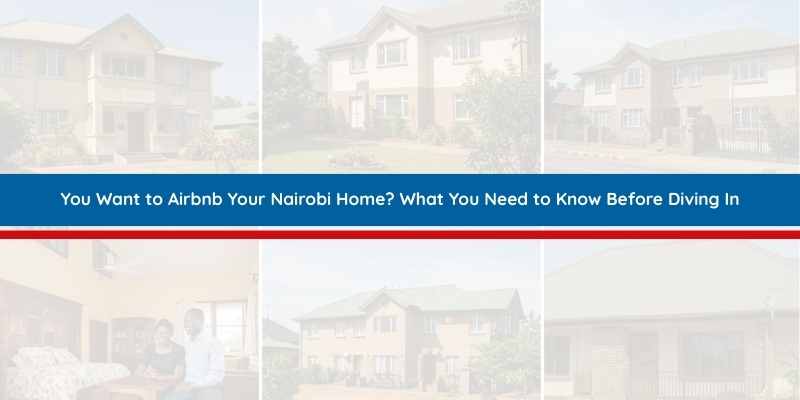So, You Want to Airbnb Your Nairobi Home? What You Need to Know Before Diving In
It’s fantastic to see the entrepreneurial spirit thriving in Nairobi. One trend we’ve noticed exploding is homeowners looking to turn their properties, whether a spare room or an entire house, into Airbnb listings. And why not? The idea of earning extra income from an asset you already own is incredibly appealing, especially in a vibrant city like ours.
Perhaps you’ve heard stories of friends making good money, seen the tourist numbers bouncing back, or simply have an empty nest you’re looking to monetize. The allure of Airbnb cash is strong, and honestly, it can be a rewarding venture. However, as someone who works closely with businesses navigating the digital landscape (which absolutely includes platforms like Airbnb), I also see the other side of the coin.
Many enthusiastic homeowners jump in, picturing easy money rolling in, only to find themselves overwhelmed by the realities. It’s not just about listing your space and waiting for bookings. Running a successful Airbnb is running a business, specifically a hospitality business, and like any business, it comes with its unique set of challenges, especially here in Nairobi.
My goal today isn’t to scare you off, far from it! It’s to give you a friendly, realistic heads-up. Think of this as a chat over coffee before you take the plunge. Knowing the potential hurdles allows you to plan, prepare, and ultimately build a more sustainable and less stressful Airbnb hosting experience. So, let’s talk about the main challenges you might face and how you can tackle them head-on.
-
The Competition is Real (and Growing!)
Nairobi is a major African hub for tourism, business, and NGOs. This means demand for short-term accommodation is high, but so is the supply. Just browse Airbnb for listings in popular areas like Kilimani, Westlands, Kileleshwa, or even the CBD fringe – you’ll see hundreds, if not thousands, of options.
- The Challenge: Standing out in a crowded market. Simply having a nice space isn’t enough anymore. Guests have choices, and they’ll compare your listing based on price, amenities, reviews, photos, and location. Getting lost in the sea of listings means fewer bookings and potentially lower nightly rates.
- The Solution:
- Find Your Niche: What makes your place special? Is it the unique decor (maybe featuring local artists?), proximity to a specific embassy or business district, family-friendliness (crib, high chair), pet-friendliness, exceptional Wi-Fi for business travellers, or perhaps a stunning view of the Ngong Hills? Highlight your unique selling proposition (USP) prominently.
- Professional Presentation: Invest in high-quality photos! Grainy phone pictures won’t cut it. Show off your space in the best light, literally. Consider a short video tour. Write a compelling, detailed, and accurate description.
- Competitive Pricing: Research what similar listings in your immediate area are charging. Use Airbnb’s Smart Pricing or third-party tools (like PriceLabs or Wheelhouse) to adjust rates based on demand, seasonality, and local events (think conferences, holidays). Don’t just set and forget.
- Stellar Reviews: This is crucial. Go above and beyond for your first few guests to secure those glowing 5-star reviews. They act as powerful social proof.
Example: A client of ours initially struggled with bookings for their otherwise lovely apartment near Yaya Centre. We helped them revamp their listing with professional photos, highlighted the walking distance to the mall and nearby restaurants, and specifically mentioned the high-speed fibre internet and dedicated workspace, targeting business travellers. Bookings improved significantly.
-
Guest Management: More Than Just Handing Over Keys
Hosting means interacting with people from all walks of life, with different expectations and communication styles.
- The Challenge: Managing inquiries, booking confirmations, check-ins, check-outs, answering questions during the stay, and handling potential issues requires time and excellent communication skills. Late-night arrivals, guests getting lost trying to find your place (Nairobi addressing can be tricky!), language barriers, and last-minute changes are all part of the game.
- The Solution:
- Clear Communication Systems: Utilize Airbnb’s messaging platform. Create template messages for common questions (Wi-Fi password, check-in instructions, local recommendations). Respond promptly – speed matters on Airbnb.
- Streamlined Check-in/Out: Consider smart locks with key codes that can be changed remotely, or a secure lockbox. Provide very clear instructions, perhaps with photos or a short video, especially if navigating your compound or apartment block is complex. Share your location accurately via Google Maps or WhatsApp.
- Set Clear Expectations: Your house rules should be comprehensive but easy to understand. Cover things like noise levels, smoking policy, parties (usually a no-go!), and guest limits. Make sure guests acknowledge these rules before booking.
- Local Guidebook: Create a digital or physical guidebook with recommendations for local cafes, restaurants, supermarkets (like Carrefour or Naivas), transport options (Uber, Bolt, matatu routes if relevant), emergency contacts, and instructions for appliances. This adds value and reduces repetitive questions.
-
Maintenance and Cleaning: Keeping it Sparkling
Airbnb guests expect hotel-like cleanliness. Wear and tear happens much faster with frequent guest turnover than with a long-term tenant.
- The Challenge: Maintaining a consistently high standard of cleanliness between guests, dealing with unexpected breakages (a leaky tap, a faulty appliance), and managing laundry (sheets, towels) can be demanding and costly. Finding reliable, thorough cleaners who understand the specific needs of short-term rentals can also be tough.
- The Solution:
- Find Reliable Cleaners: Get recommendations, conduct interviews, and perhaps do a trial clean. Create a detailed checklist for them to follow. Ensure they understand the quick turnaround times often required. Have a backup plan in case your primary cleaner is unavailable.
- Budget for Maintenance: Set aside a portion of your earnings for repairs and replacements. Things will break. Having a fund ready avoids stress and allows for quick fixes, minimizing disruption for guests.
- Durable Furnishings: Invest in good-quality, durable furniture and linens that can withstand frequent use and washing. Avoid delicate items that are easily damaged.
- Stock Adequately: Ensure you always have enough clean linen sets, towels, toiletries, and basic kitchen supplies (tea, coffee, sugar, salt). Running out is unprofessional.
- Schedule Deep Cleans: Regularly schedule deeper cleaning sessions (windows, ovens, behind furniture) in addition to the standard turnover clean.
Example: One host we know struggled with negative comments about cleanliness until they hired a dedicated cleaner specifically trained for Airbnb turnovers and provided them with a photo checklist of exactly how each room should look upon completion.
-
Security Concerns: Protecting Your Property and Guests
Safety and security are paramount for both you and your guests. Nairobi, like any major city, has areas of concern, and guests (especially international ones) might be particularly conscious of security.
- The Challenge: Ensuring guest safety, preventing theft or damage to your property, vetting guests, and handling security breaches if they occur.
- The Solution:
- Invest in Security Measures: Good locks on doors and windows are essential. Consider a smart lock for traceability. If you have a compound, ensure the gate security is reliable. Security cameras outside the property (clearly disclosed in your listing – never inside private spaces!) can deter issues. A small safe for valuables might be appreciated by guests.
- Guest Screening: Use Airbnb’s tools. Read potential guests’ reviews from previous stays. Don’t be afraid to ask clarifying questions or decline bookings that feel suspicious. Avoid off-platform bookings and payments, as you lose Airbnb’s protections.
- Security Deposit: Utilize Airbnb’s system for security deposits to cover potential damages. Document the condition of your property before each guest (photos/videos).
- Clear Rules: Explicitly state rules regarding unregistered guests and parties.
- Emergency Information: Provide clear contact information for yourself (or a local contact person), nearby police stations, and recommended taxi services.
-
Navigating Regulations and Taxes
The regulatory landscape for short-term rentals can sometimes be unclear or evolving.
- The Challenge: Understanding and complying with potential Nairobi City County regulations, zoning laws, homeowner association (HOA) rules if applicable, and tax obligations (like income tax on your earnings). Non-compliance can lead to fines or shutdowns.
- The Solution:
- Do Your Research: Check the Nairobi City County website for any specific requirements or licenses for short-term rentals. This area can change, so stay updated.
- HOA/Lease Agreement: If you live in an apartment complex or gated community, check your lease agreement or HOA bylaws. Some explicitly forbid short-term rentals.
- Tax Compliance: Remember that Airbnb income is taxable income. Consult with a tax advisor to understand your obligations to the Kenya Revenue Authority (KRA) and keep meticulous records of income and expenses (cleaning fees, supplies, repairs, commissions).
- Be Prepared for Change: Regulations can evolve as authorities adapt to the rise of platforms like Airbnb. Stay informed through local news and host communities.
-
Income Fluctuation and Costs
While potentially lucrative, Airbnb income isn’t always consistent.
- The Challenge: Occupancy rates can vary significantly depending on the season (high season vs. rainy season), local events, and economic factors. You also need to account for costs beyond basic maintenance, such as higher utility bills (water, electricity, Wi-Fi), Airbnb service fees, cleaning fees (if you don’t charge guests separately), supplies, and potential insurance upgrades.
- The Solution:
- Budget Realistically: Don’t assume 100% occupancy. Base your financial projections on a conservative estimate (e.g., 50-60% occupancy initially).
- Build a Buffer: Create a cash reserve to cover expenses during slower months.
- Manage Utility Costs: Consider energy-efficient appliances (LED bulbs). Remind guests politely (perhaps in your guidebook) to conserve water and turn off lights/AC when leaving. Factor utility costs into your pricing strategy.
- Track Expenses: Keep detailed records of all income and outgoings. This is crucial for understanding your actual profit margin and for tax purposes.
It’s a Marathon, Not a Sprint
Turning your Nairobi house into an Airbnb can absolutely be a successful venture. I’ve seen many property owners thrive, enjoying not only the financial benefits but also the connections made with travellers from around the world.
However, success rarely comes without effort. It requires treating it like a business – demanding professionalism, attention to detail, excellent customer service, and proactive problem-solving. The challenges are real, from fierce competition and demanding guest management to the less glamorous tasks of cleaning and repairs.
By understanding these potential hurdles before you start, you can create strategies to overcome them. You can set realistic expectations, build robust systems, and focus on providing an outstanding guest experience. That, ultimately, is the key to standing out, earning great reviews, and achieving the hosting success you’re dreaming of.
So, are you ready to put in the work? If you approach it with open eyes and a solid plan, the Nairobi Airbnb market holds great potential for you.
All the best on your hosting journey!
Warmly,
Francis Waithaka CEO, digital4africa.com


